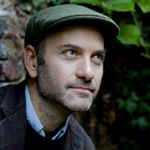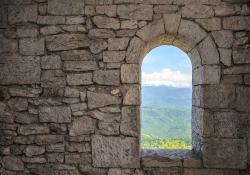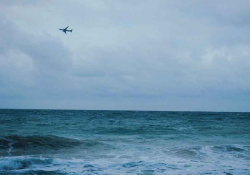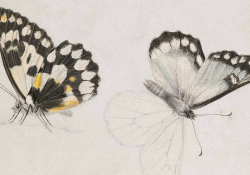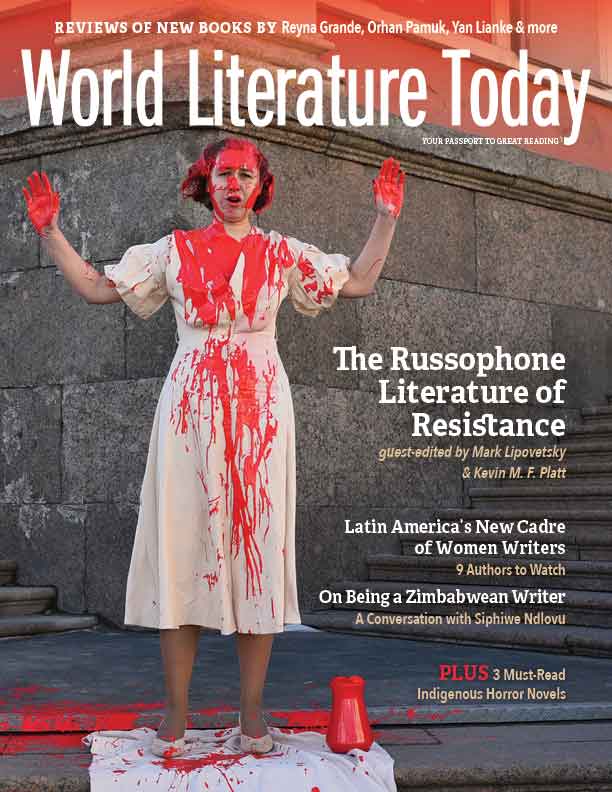Two Latinx Poems
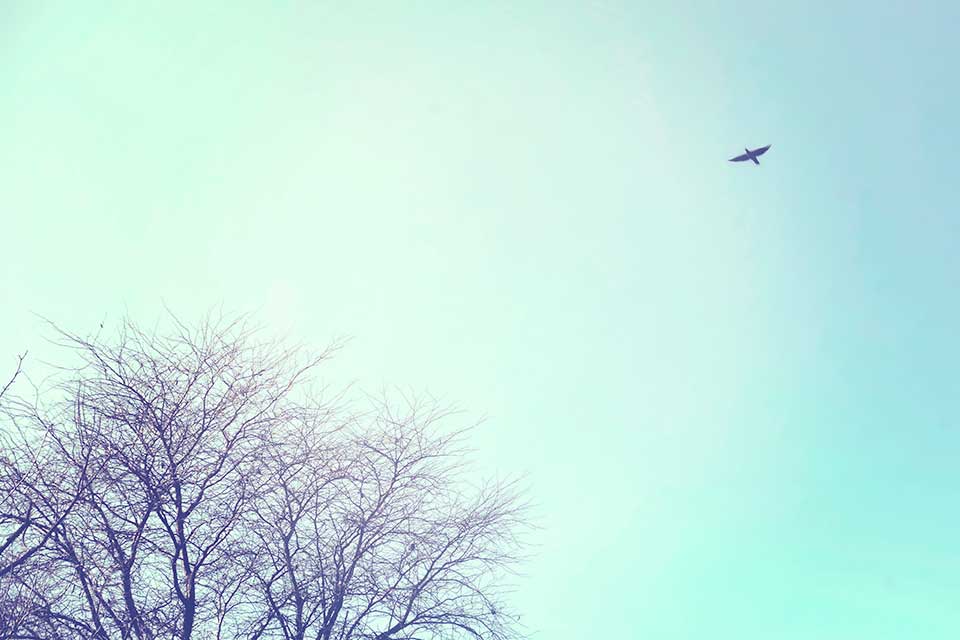
Landscape at the Third Stage of Grief
by Alexandra Lytton Regalado
I
This year my knees are having a hard kneel. This candle’s fire
has two hard eyes. The tree outside my window is two
hard branches. My ankles cross at their hardest.
Mornings crack open a blade. Words stagger, snag
on the hem of curtains. The sprinklers always turn on
when I want to lay on the lawn. The lawn has a bad burn.
Our dog knows to lay out in the sun for twenty minutes.
Our bones are depleted and hungry for sun. But the sun
has moved slant. The rains, too early. Flowers will fall as buds.
My mother will never see this tree in bloom. It has been a hard year
for a daughter. I am now the matriarch. It’s a hard year for matriarchs.
There is no April in these bones. There is a craving for salt,
new imagery. It’s all about leaves, cut leaves, dry leaves. No more
talk of things that grow. Perhaps, consider the roots,
the ground they push against. It’s been a hard year for mothers.
Why does it surprise us when things are hard? Death leaves us
untethered. What grows without roots? What is the thing my mother
said in the unlit room, sitting at the foot of my bed, when I could smell
her perfume, and her deep voice and I sat up and asked,
Are you there, and woke up? I could smell sandalwood and see
her knobbed hands. Now, she looks at me from a distance.
Is she now birdsong, is she the knot in my stomach, the thing
I search for as I enter every room. It’s been a hard year
for me. There are no metaphors in that statement. No twists
or ribbons of glitter trails, just the stripped, plain dirt of it.
The ripped-out root, the hole in the ground. The things that
no longer bloom. The water I continue to pour into the ground.
II
Birds throw out their song and do not care
that the grass is scorched, and they tease out insects
from the blades or shift midflight to catch them
in the air. I am the one that is hard. I am the one that is chipping
away. I am the stone that meets the spade. I am the one
that tumbles and turns her back. I am the pumice to leave
everything smooth. Rain over me. Slide over me. I want it all
to pass. I am brown and dry, the mountainside crying its alarm
of cicadas. The tree made better because it adapts,
the tree with a fallen branch, torn by wind. It’s been a hard
year for all of us. And we are two stones clicking together.
We will never be in stasis. I dig and dig and my hands
elbow-deep and the rocks never end, this ground not apt
for plowing; plants move around stones and I am
the stone and the root that wraps around the stone.
Patria Archipelago
by Leo Boix & Alexandra Lytton Regalado
responding to Kati Horna’s photographic series Ode to Necrophilia
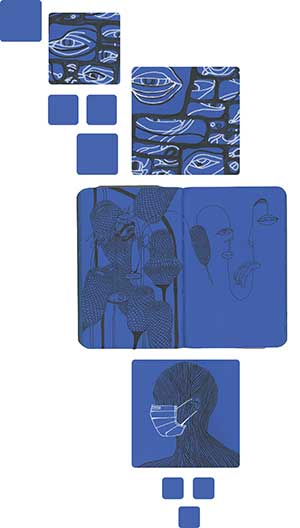 And then the time came to be inside
And then the time came to be inside
this island a room he carved out of
(the mask
grinned, the mask always
grinned)
foreign things he often dreams of: an English
umbrella by his unmade bed
a pair of worn-out shoes (not his) a candle—una vela candela
burning in broad daylight
Outside, a desperate fire . . .
He stands half-dressed in the middle
of the locked room alone, marooned
His face in his hands—
el rostro en sus manos unmasked
* * *
Yo te velaba,
I am the lit candle at your feet,
already mourning you,
y tu también me velabas.
All that happened before
does not matter, now, in this room,
as years pour over us, the sun sharpens
the walls, our outlines lit
in this cleaving.
* * *
He leaves the mask on his pillow
a catafalque then the mask speaks:
“Beneath the black veil an orphan
wanders the whitened fields of Argentina”
Time stands still the candle stops quivering Father returns
to ask hijo, are you alright? Back then I didn’t want to know
his husky voice
disguised . . .
He brings a mirror from the afterlife hijo, mirá
hay luz del otro lado
del túnel
The mask reveals a face bone-white shell, lunar
empty carapace, a husk
alabaster, a shard.
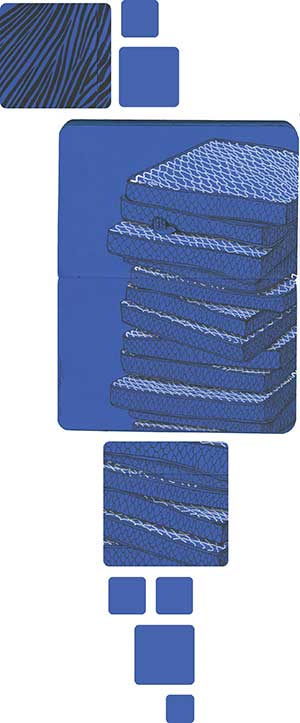 * * *
* * *
Your hands, which I loved,
now a clutch of twigs, paper skin,
galaxies of bruises.
Bedside, I pray a rosary
you would believe in
counting no beads, but fingernails,
evidence of our survival, mouthing words,
rubbing the pads of my fingertips,
smooth as polished stones,
and your breath the ocean
raking over those stones.
* * *
He crossed the ocean on a ship of fools
inside the vessel a memory of
what he’d left behind he traveled at night
held a candle on his wooden cabin, a single bed
he dreamt of rundown ports quays a murky river
the intense heat of the subtropics a desolate wake
filled with carnivorous flowers from far away
the mask spoke again:
look down at your own past
his hands clasped
in a cup—un amuleto
smeared with mother’s betún
for an auspicious journey.
* * *
Sunlight and smoke coax things into visibility.
You, at a distance, in a landscape I invented—
and how that distance rendered us perfect,
the dividing contour of the body no longer there.
I thought it my job to find the plot,
to create a list of things good and bad
that could happen.
But the story was in the telling,
the details we chose to include.
The moment I decided a castaway’s raft was a better fate,
as a bird flings itself into empty space,
because the story can’t end when the pain begins.
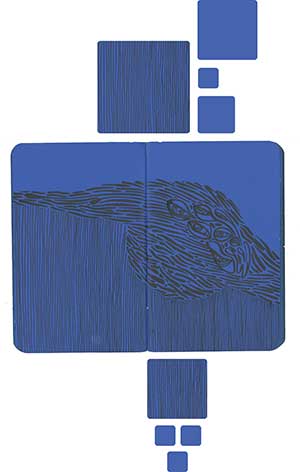 * * *
* * *
Él, dentro de la casa que no era
en ese continuo
deshacerse
underneath the rugs
behind the commode
by the heavy wardrobe
there are books in Spanish
que no volverá a leer
golden spiders, trilobites
house martins without southern magnets
there is a photo
de cuando se despidieron en el aeropuerto. . .
a distant airport
days ancient days
when nothing much happened
todo se va deshaciendo . . .
Mask speaks to him:
“Build a nest
inside a hollow tree
in the form of your father’s body
It’ll take you a lifetime to complete it”
* * *
At home, you were the ghost
that haunted the doorway,
a hunched figure in the corner
of the living room, hooded
and blending in with the furniture.
You had to live in another
continent to feel our distance.
Letters from a Buenos Aires apartment
on Avenida Libertador,
it was the most you’d ever written to me.
I am still the reader of these pages, hunched over them,
always, even when I look up.
Mornings I’d find a spool of pages;
how my fingerprints
on the slick paper erased your words.
I burned those words
into my skull: bruising
purple and orange solar flares.
A cave to revisit, to study your words
like glyphs of hunted animals.
From the thin air launches a quiver
of arrows and meanings engulf me
sharp as rain.
* * *
His father’s lying body
lifted to a fourth floor
a badly oiled elevator
a place smelling of decaying
flowers, diluted
bleach.
Inside a chapel, a large cross made of flickering
neon violet lights
a small woman washing slabbed floors
lost bees
trapped inside
The son wasn’t there they told him on the phone
He remembers the light those big tropical orchids
in the shape of multicolored
cut-out hearts
their aerial roots going down
In the dream, his father sings
behind heavy curtains
in the southern house:
“Lo que queremos decir y no podemos /
lo cubrimos con un manto azul y transparente”
* * *
We are the music of smoke, of red wine, of racing hooves,
of leather, of dust, of slanting sunlight.
At your bedside worrying my cuticles, biting off
frayed bits of skin,
my back to the door, light slices
through the wooden slats onto the white sheet.
I lean
to whisper in your ear, words
etched in the cave.
You furrow your brow, a fraying dream;
I smooth the wrinkle
with my thumbs.
Your body now a skein, telling us clearly now
what we are: bones.
My left hand itches and I wonder what it is
they say: will I lose
something or find something?
Will it be harp strings and no more
breath, one more breath, a gasp,
like the cough which could have been a laugh, a cry
urging a horse to gallop.
* * *
Outside his room the world he knew was beginning
to vanish everything changed the orphaned
world of the past the island within the mask wasn’t there anymore
father had sent a last message un último mensaje
in a green bottle a bottle perfectly beautiful
the inside of a whale its crystal membranes of the past to be delivered
to his only son el hijo del medio it arrived safely
the bottle carried an infinite letter
a bag with
his shining fluorescent bones
birthmarks ossuaries to remember
like grieving pachyderms on an aimless trail his last words
inside the glowing glass
“Querido Leo
Let this be our story”
* * *
Because I will do as the wind instructs,
traveling like Theseus’ ship,
every nail, every board replaced
as it traverses oceans.
Each decade our cells renew;
is it the same ship,
are we the same
father and daughter?
We mistake our ideas of things for the things themselves.
I pose for the memory in your eyes,
but, as always, it is when I step away
that you reach out.
I will stand in the patio and watch your deathbed
through the window
as the clouds part, no moon summoned by tides,
not Venus Nixtamalero,
but a single nameless star, and you will disappear
from this known world
the way a pebble ripples into still water.
Editorial note: Read a conversation with Lytton Regalado. This long poem was made into a short film, animated by Salvadoran artist Ulises Vaquerano Ramírez and produced by Nuevo Sol, that premiered last October at the London Literature Festival at the Southbank Centre. The illustrations included here are from Vaquerano’s work animating the film.
Ulises Vaquerano Ramírez is a Salvadoran visual artist and art director, who deals with themes of memory, interiority, chaos, palimpsests, gender, queerness, and migration, as they have experienced since their residence in Mexico.

